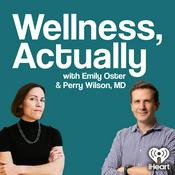GLP-1s. Colostrum. Microplastics. Red light therapy. Vaccines. There’s a staggering amount of health and wellness news and information, and it’s bombarding us everywhere we look. Who’s got time to parse it out, to verify it, and then to actually do the work of improving our health? And what if those wellness influencers actually knew how to read a medical study?
That’s why we’re here. We are Emily Oster, best-selling author and data expert, and Perry Wilson, a medical doctor. And our goal is to separate fact from fiction, causality from correlation, so that you can stay informed without being overwhelmed. Every episode, we cover the health news of the week, take listener questions, and do a deep dive into a buzzy and misunderstood wellness topic so that you can actually make the best decisions for your own health.
So join us for a weekly dose of sanity. It might actually be just what the doctor, and the economist, ordered: health advice for real life.
See omnystudio.com/listener for privacy information.



